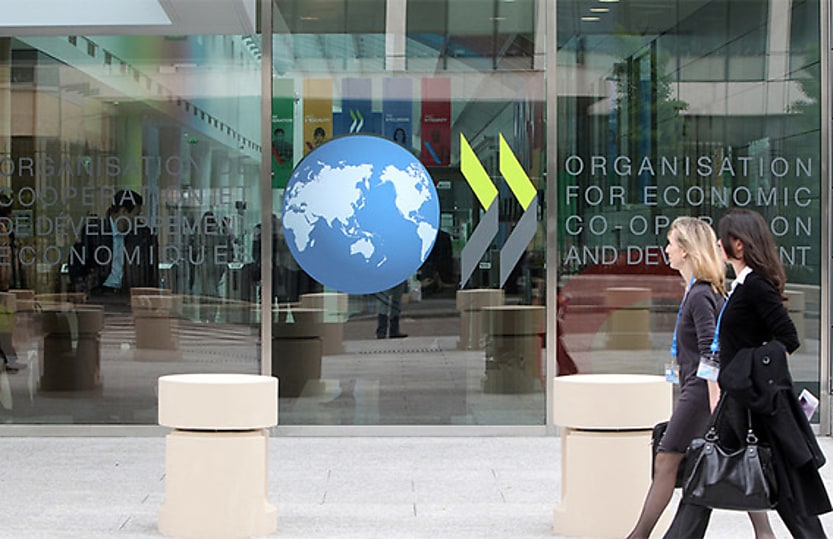NDIS cuts, labour mobility boosts needed to fix Australian productivity: OECD

The OECD has prescribed restrictive monetary policy and productivity-enhancing policy measures to boost Australia’s medium-term economic growth.
Global interest rates will hold steady for longer than expected despite historic falls in headline inflation, according to the OECD Economic Outlook.
Three rate cuts are anticipated between the September quarter and the end of 2025, while the OECD said: “Monetary policy should remain restrictive in the short term to tame inflation.”
Global economic growth is expected to stabilise before modestly picking up through 2024–2025, thanks to a stronger-than-anticipated US and emerging-market recovery.
The relatively positive outlook, albeit subdued, is less grim than Treasurer Jim Chalmers’ diagnosis of a “fraught and fragile” global situation.
Growth in Australia’s real GDP is expected to slow to 1.5 per cent across 2024, before rising to 2.2 per cent in 2025 – hampered by stubborn services inflation requiring a tighter monetary policy than expected.
Australia’s March quarter inflation was higher than expected, leading many to believe the RBA will be forced to increase its near-term inflation forecasts next week.
The consumer price index rose 3.6 per cent in the 12 months leading to March, slightly above the RBA’s forecast of 3.5 per cent.
That said, the OECD estimates that rising national unemployment (from 3.8 per cent currently to 4.3 per cent in 2025), will help to cool inflation.
Australia’s restrictive cash rate – which has been held steady at 4.35 per cent since November 2023 – will likely be held stable until inflation is under control.
Once again, productivity-enhancing reforms were the order of the day, with proposed cuts to NDIS costs, greater flexibility in land zoning systems to facilitate business competition, and reducing barriers to labour mobility through red-tape cuts.
While the National Disability Insurance Agency forecasted that the scheme would cost taxpayers close to $100 billion per year by 2032, a proposed shakeup would see states and territories contributing to the scheme.
The OECD also endorsed doing away with unnecessary non-compete agreements in employment contracts to boost labour mobility and productivity, as championed by Assistant Treasurer Andrew Leigh.
Last month, the government released an issues paper on non-compete clauses which are estimated to bind approximately 1 in 5 Australian workers.
“Non-compete clauses have been found to apply not only to senior executives but to many low-wage workers, including boilermakers, hairdressers, early childhood workers and yoga instructors,” wrote Leigh.
“It’s important to make sure we have the right balance, and that these clauses are not acting as a drag on competition, productivity and wages.”
The world at a glance
A sense of “cautious optimism” is beginning to show in global markets, despite slow growth and ongoing geopolitical uncertainty, said OECD chief economist Clare Lombardelli.
Inflation is letting up beyond expectations, while unemployment remains at or near record lows.
Global growth was roughly consistent with pre-COVID-19 pandemic levels and above last year’s projections at 3.1 per cent, followed by an anticipated 3.2 per cent growth across 2025.
That said, the growth was not evenly spread – with lagging recoveries in Europe and Japan being propped up by a more robust US, led by strong household consumption and stimulating fiscal policy.
The US’ estimated growth of 2.1 per cent was revised to 2.6 per cent given the better-than-expected recovery, with similar, albeit more modest, revisions for China (from 4.7 per cent to 4.9 per cent expected growth this year).
Private sector optimism is generally improving despite concerningly low productivity. Speculators are once again banking on an artificial intelligence-led productivity recovery, bolstered by internationally consistent competition policy.
Lombardelli also sounded the alarm bell for a needed fiscal rebuild, in light of long-term challenges, including rising debt and public expenditure demands associated with ageing populations, mounting decarbonisation pressures, and growing defence budgets.







Comments (0)
Comments powered by CComment